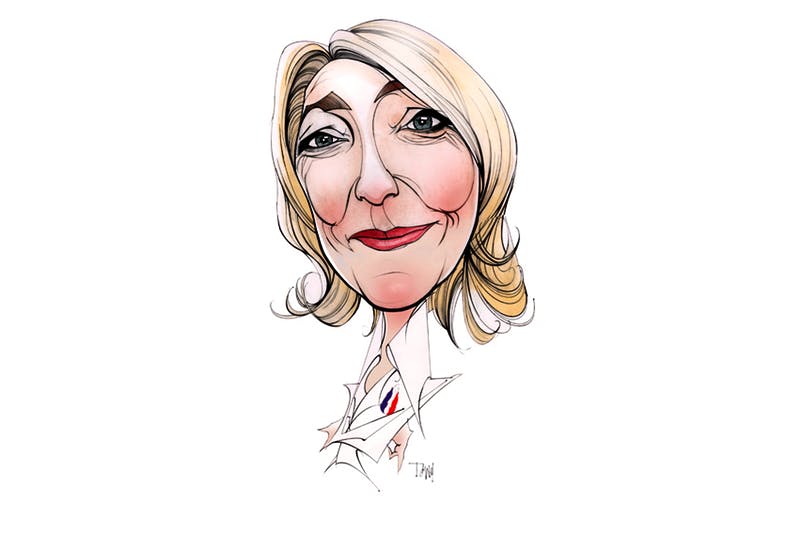Many years ago I married into a family of the French working-class. They came from Aveyron, La France Profonde, and most were dyed-in-the-wool socialists. But at a barbecue in the summer of 2002 one, Fabien, admitted that he had cast his ballot for Jean-Marie Le Pen in the recent election. A quarrel ensued but the young man stood his ground. His car had been broken into three times in a matter of months and the police in Marseille had shown no interest. Voting for Le Pen was Fabien’s protest at the police indifference to petty crime.
Twenty years later and it is no longer unusual to discover young people who vote for Le Pen’s daughter, Marine. A poll this month revealed that 29 per cent of 25 to 34 year-olds intend to vote for her party, an increase of 6 per cent on those who backed her at the 2017 election. According to the poll, only 20 per cent of this demographic will vote for Emmanuel Macron, a drop of 9 per cent from the election four years ago. In contrast, the 18-24 age group are more supportive of Macron (29 per cent) and less enamoured of Marine Le Pen (20 per cent).
There are several reasons to explain this discrepancy. This younger generation are more ‘woke’ than their elders, and identity politics has taken root in French universities only recently. They have also been less exposed to Islamic terrorism than the 25 to 34 age group, who saw their friends slaughtered in 2015 and 2016. They were on the frontline of the ‘war’ with Islamic extremism, and they are also disillusioned economically with a president who came to power promising much but who has delivered little in the last four years.
Macron’s opponents accuse him of presiding over a country that is slipping into anarchy
According to the polling company that conducted the recent survey, only one in five young people voted in the two rounds of the 2017 presidential election, but one in two declare that they will have their say next year.
This could be decisive in determining the victor of the election. So, too, will the constant drip of violent incidents relayed in the media. On Monday, for example, a Sudanese national was jailed for four years for a series of assaults on women in the city of Clermont, while at the weekend footage went viral of a man pushing a woman down the stairs of a metro station. Marlène Schiappa, the Minister for Citizenship, tweeted her outrage at the clip. The assault coincided with Schiappa’s admission that some districts of Paris are ‘dangerous’ for women and her promise to make them safer.
Schiappa has done her best to stem the verbal and physical assaults committed against young women – in 2018 she introduced an anti-sexual harassment law that netted 700 fines in its first year – but the violent attacks haven’t stopped. Sexual violence against women rose by 19 per cent in 2018 and 12 per cent the following year. It continued unabated in 2020 with one of the most high-profile cases that of a young woman who was assaulted by an 18-year-old man because he judged her skirt to be ‘too short’.
Andréa Kotarac, who is representing Le Pen’s National Rally in June’s regional elections, explained in an interview why he was not surprised to learn that his leader appeals to the young. ‘She is close to their reality,’ he said. ‘The street has become a danger in our country. That affects the young, notably young women, and we have a left who deny this reality.’
In its report of the growing support among the young for Marine Le Pen the left-wing newspaper Le Monde blamed it in part on the ignorance of this demographic about her father, Jean-Marie. But there are few ideological similarities between the pair. She has worked hard to de-demonise her party, but above all her manifesto – as Kotarac stated – strikes a chord with the young. Le Monde asked three young voters why they supported Le Pen and their reasons were immigration, security, cultural insecurity and ‘fractures identitaires.’
According to the political scientist Jean-Yves Camus, there is a correlation between those who vote for Le Pen and their ‘level of income and diplomas’. But it would be a fallacy – as it was with Brexit – to imagine that only the working class vote for what the chattering classes consider beyond the pale. I recall a conversation I had on a train a few months before the 2017 election; my fellow passenger was a director of human resources in an international company in Paris, and she had no inhibition in telling me that she would be voting for Le Pen for the sake of her teenage daughters, for whom she increasingly feared.
This week Macron visited Montpellier to reassure voters that he understands their concerns about the growing lawlessness. His arrival coincided with the attempted murder of a pedestrian, shot twice in the chest and once in the back just up the road from the president’s walkabout. Macron has said 10,000 more police officers will be recruited in the next 12 months but his opponents accuse him of presiding over a country that is slipping into anarchy. ‘The president of chaos, of violence everywhere, all the time, of division, of social, fiscal and territorial injustice, is now selling us the peaceful life,’ said Marine Le Pen.
The young seem to be siding with Le Pen’s pessimism and not Macron’s optimism that law and order will soon be restored to French streets.







Comments